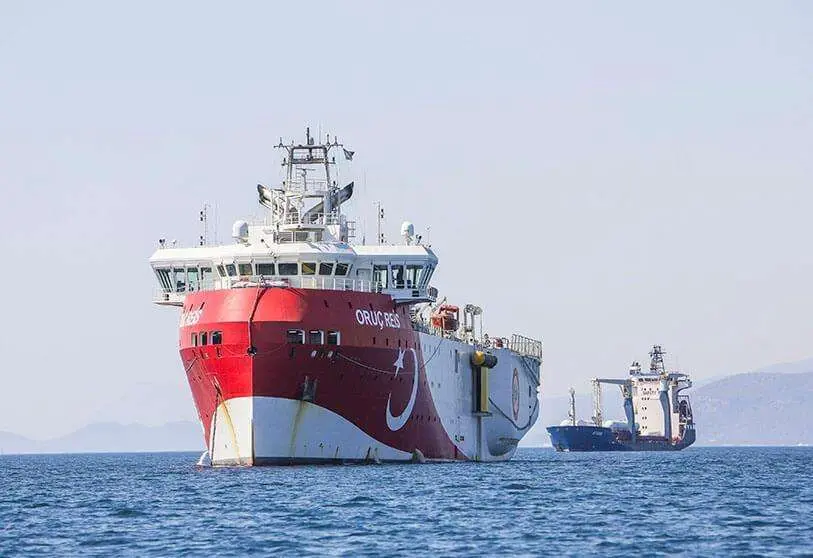Turkey versus Greece, the confrontation that threatens the stability of the region

The drums of a new diplomatic conflict are sounding louder than ever in the eastern Mediterranean. "Turkey has the political, economic and military strength to destroy immoral maps and documents. They will understand the language of politics and diplomacy through bitter experiences. Turkey and the Turkish people are prepared for all possibilities and consequences". These were the words used by the president of Turkey, Recep Tayyip Erdogan, after his Ministry of Defence announced new military exercises in the waters of this sea, in the middle of an unprecedented political crisis because of the search for natural gas in this area. The Turkish president threatened Greece to start talks on the escalation of tensions or to face the consequences.
The drill - which began this Sunday and will last until 10 September - has triggered a wave of reactions from the international community. Tension has been heightened after Ankara announced the start of seismic prospecting activities by the ship Orus Reis on the Greek islands of Kastellorizo and Crete. Greece and Cyprus claim the area as their exclusive economic zones.
Ankara will carry out these military exercises together with the so-called -- by Ankara -- Turkish Republic of Northern Cyprus (TRNC). The Eurasian nation does not recognise the Republic of Cyprus and claims that the citizens of the Turkish Republic of Northern Cyprus, a state that only recognises Ankara, are entitled to a share of the island's gas resources.
"There is a possibility that this conflict will get worse. However, these two countries also have a history of knowing how to limit the level of violence between them," Gallia Lindenstrauss, a researcher at the Institute for National Security Studies in Israel, told digital Arab News. "It seems that the Greek side still holds its past positions and that Turkey is using this crisis to set in motion a broader agenda than the mere legal dispute," she added.
For his part, Turkish-Greek relations expert Paul Antonopoulos believes that the proposed NATO talks will not yield any results in the short term because of "disagreements on conditions", according to the aforementioned newspaper. "As Turkey not only refuses to send its ships back to the port, but actually has increased the rhetoric of war and invasion against Greece, the discussions will not take place under these conditions", he has stressed.
This expert also considers that Ankara's foreign policy is rooted in "a maximalist impulse of neo-otomanism". "It is not surprising that all of Turkey's military interventions have been carried out in countries that are not only former Ottoman territories, but are also rich in energy", he has pointed out.
Disagreements over who can exploit the gas in Mare Nostrum have increased tensions in the region. After the announcement of the start of new military exercises by Ankara, several Turkish media reported that the Bosphorus country was transporting dozens of tanks from the Syrian border to the northwest front of the country bordering Greece.
The newspaper Cumhuriyet has confirmed this Saturday that 40 tanks were being transported from the Syrian border to Edirne in the northwest of Turkey. A military man has clarified that the deployment is a regular movement of the forces and has nothing to do with the tension with Greece, according to the AP news agency. However, the news agency Anadolu has denied these accusations and has pointed out that the transfer of the tanks was previously planned by the Turkish Second Army based in the eastern province of Malatya.
Meanwhile, the president of the Nationalist Action Party (in Turkish Milliyetçi Hareket Partisi, MHP), Devlet Bahçeli has declared that the war with Greece is "only a matter of time". "It is inconceivable to turn our back on our historical interests in the Mediterranean and the Aegean", the Turkish politician said, according to the statements collected by the Middle East Monitor newspaper. "Greece's goal is to return and occupy our lands from where we threw them out 98 years ago. We are facing a new invasion plan", he warned before pointing out that "from now on, it is Greece's attitude and behaviour that will determine the growing tensions that could lead to an abominable confrontation".
In response, Greek minister Adonis Georgiadis has said that Greece is not afraid of Turkey. "Going out and threatening with wars and rivers of blood in France or insulting Macron in this way should be a serious concern for the Turkish citizens because it goes beyond the limits of diplomacy and politics", he warned. "There is no doubt that Erdogan has the resurgence of the Ottoman Empire in mind. Anyone who thinks that Greece is afraid is making a big mistake. In these 35 days that we are with the fleet in the Aegean, because it is the biggest mobilization of the fleet in decades, we have made Greece a reality prepared for war extremely better than many people could have thought," he added.
Moreover, during his speech he stressed that "Turkey is not a great superpower as many people think"; therefore Greece is ready "not to let itself be carried away by the regime of threats or give up its aspirations", the Greek City Times has reported. The strategic importance of this region has always been present as, on one hand, it is the gateway to the Red Sea through Egypt and, on the other hand, the entrance to Europe. The discovery of large gas deposits by Israel, Egypt and Lebanon in 2009 has opened a new wound in the area.









